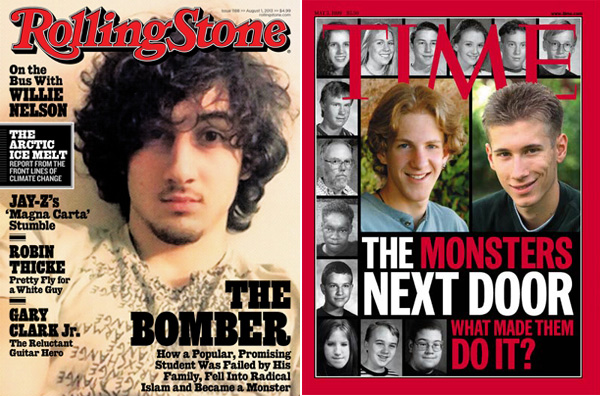
Covers like the new Rolling Stone issue are hardly without precedent.
Sometime between the time I went to bed on Tuesday night and woke up Wednesday morning, it became impermissable to run a photo of someone who committed horrific acts of violence on the cover of a major publication.
Having worked for publications since not long out of college, and having consumed them for many many years, this came as something of a surprise. We've seen Ted Kaczynski, Osama bin Laden, Timothy McVeigh, Eric Harris and Dylan Klebold, and more emblazoned on major magazine covers, not to mention many other slightly less notorious evil-doers on the front pages of major newspapers since I became conscious.
Then, yesterday, this:

It's not just Walgreens; it's also CVS and 7-11. The issue in question is a Rolling Stone cover story about Dzhokhar Tsarnaev, one of the two alleged Boston bombers (his older brother and alleged accomplice is dead).
CVS got the ball rolling; no less a bad idea, but perhaps sympathetically understandable, as it's a Boston-based company. Then Walgreens and 7-11 followed. As someone in the magazine industry, I'd like to think I have an eye for what is "provocative"; the cover seemed quietly provocative, but hardly the sort of thing to touch off a ban in major retail outlets.
The motivation behind the cover is simple enough to read. The story describes Tsarnaev as a well-liked, (publicly) well-adjusted high schooler who was a talented student and athlete. A couple years later, he's going on trial for a horrific bombing. The piece attempts to fill in what happened. It does so very well, and reflects the portrait of Tsarnaev that's emerged from prior reporting.
The reason I didn't find it provocative is that this is pretty typical: someone young, who does something terrible, will often have left a trail of normal behavior. Dylan Klebold was a pretty normal teenager from an upstanding family, Kip Kinkel was a more troubled one but from a similarly normal family. We know this because of very good journalism, like Dave Cullen's book Columbine and Frontline's "The Killer at Thurston High." Janet Reitman's profile of Tsarnev is an excellent but hardly atypical example.
Nor is the cover remotely without precedent. Just see the Time cover at the top of this story.
Both issues even use the same word.
Figuring out exactly why people were upset about the cover led to some dark places of the Internet, but I take it the consensus is this: "The layout, which is being described as 'shocking' and 'offensive,' resembles any number of rock star images that have graced the magazine over the years… and that's exactly the problem…. [T]he combination of Tsarnaev's casual, glamorous appearance with the famously 'cool' magazine's attitude just isn't sitting well with most people."
Rolling Stone is "famously 'cool'?" The cover may be distracting people from "Robin Thicke: Pretty Fly for a White Guy."
I kid. It has a decades-long reputation for thoughtful longform journalism about difficult subjects. Its music coverage also has a… reputation.
In her profile of Tsarnaev, Reitman writes:
In retrospect, Jahar's [Tsarnaev's nickname] comment about 9/11 could be seen in the context of what criminal profilers call "leakage": a tiny crack in an otherwise carefully crafted facade that, if recognized – it's often not – provides a key into the person's interior world. "On cases where I've interviewed these types of people, the key is looking past their exterior and getting access to that interior, which is very hard," says Tom Neer, a retired agent from the FBI's Behavioral Analysis Unit and now a senior associate with the Soufan Group, which advises the government on counterterrorism. "Most people have a public persona as well as a private persona, but for many people, there's a secret side, too. And the secret side is something that they labor really hard to protect."
Her piece takes that crack and follows it into the cultural and familial life Tsarnaev kept hidden from his friends. Had it not been so secret, perhaps Tsarnaev would not have ended up so alienated from the culture he nearly embraced; perhaps tragedy would have been avoided, or at least Tsarnaev would not have been pulled into it by his brother. Burying the issue, as Walgreens has done—and, more disappointingly, public officials like Boston mayor Thomas Menino—is a step in the wrong direction.


